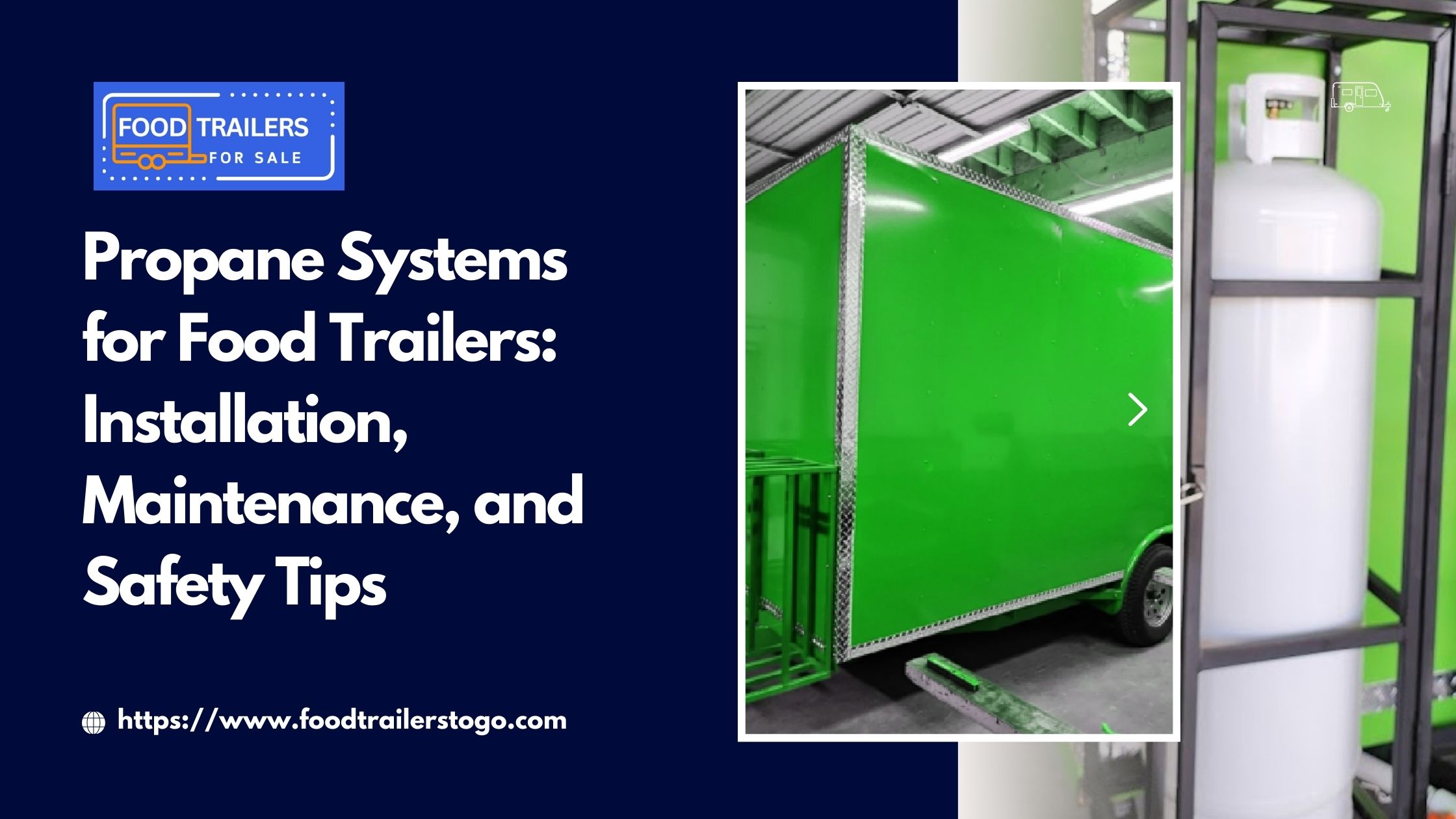Food trailers are more than just mobile kitchens; they are thriving businesses that bring culinary delights to diverse audiences. Among the essential components of a food trailer is its propane system, which powers vital equipment like grills, fryers, and stoves. Ensuring a proper installation, maintenance, and safety routine for propane systems is critical for smooth operations and preventing accidents.
In this guide, we will dive into everything you need to know about Propane Systems for Food Trailers: Installation, Maintenance, and Safety Tips. Whether you are starting a new food trailer venture or upgrading your existing unit, understanding these systems can help ensure safety, efficiency, and compliance with regulations.
Why Propane Systems Are Essential for Food Trailers
Propane is a reliable and efficient energy source that provides consistent heat for cooking. It offers several advantages for food trailer operators, including:
- Cost Efficiency: Propane is often cheaper than electricity for powering kitchen appliances.
- Portability: Propane tanks are easy to transport and refill.
- High Performance: It delivers rapid heating, which is crucial in fast-paced food service environments.
- Eco-Friendliness: Propane burns cleaner compared to other fossil fuels, reducing your carbon footprint.
These benefits make propane an excellent choice for food trailers. However, improper handling can lead to safety hazards, underscoring the importance of professional installation and maintenance.
Installation of Propane Systems in Food Trailers
Installing a propane system in your food trailer involves careful planning and expertise. Here are the critical steps to ensure a safe and efficient setup:
1. Designing the Propane System Layout
Before installation, a professional technician designs the layout of your propane system, taking into account:
- Equipment Requirements: The type and number of appliances that will use propane.
- Ventilation: Proper air circulation to prevent the buildup of propane fumes.
- Storage Space: Secure placement for propane tanks.
2. Choosing the Right Components
The quality of propane system components is vital for safety and efficiency. Essential components include:
- Propane Tanks: Select tanks that meet your trailer’s capacity needs.
- Regulators: Ensure consistent gas flow.
- Hoses and Connectors: Opt for durable and heat-resistant materials.
3. Professional Installation
Only certified technicians should install propane systems to comply with local regulations and safety standards. The installation process involves:
- Securing propane tanks to prevent movement.
- Connecting hoses to appliances and tanks.
- Testing the system for leaks using soapy water or gas detectors.
Propane Tank Sizes and Uses
| Tank Size | Capacity (Gallons) | Ideal Use |
|---|---|---|
| 20 lbs | ~4.7 | Small grills and fryers |
| 40 lbs | ~9.4 | Medium-sized trailers |
| 100 lbs | ~23.6 | High-volume cooking operations |
Maintenance of Propane Systems
Regular maintenance is key to ensuring the longevity and safety of your propane system. Neglecting maintenance can lead to equipment failures, leaks, and hazardous conditions.
1. Routine Inspections
Conduct regular inspections of your propane system, focusing on:
- Hoses and Connections: Check for wear and tear or leaks.
- Tanks: Ensure tanks are free from rust and dents.
- Regulators: Verify proper functioning and replace faulty regulators.
2. Cleaning the System
Keep your propane system clean to prevent blockages and maintain efficiency:
- Use a soft cloth to wipe down connectors and hoses.
- Remove debris from ventilation areas.
- Clean appliances powered by propane regularly.
3. Schedule Professional Servicing
At least once a year, hire a professional technician to perform a thorough inspection and servicing of your propane system.
Maintenance Checklist (Bullet Points)
- Inspect hoses and connectors for leaks.
- Replace damaged components promptly.
- Ensure propane tanks are stored upright and secured.
- Test gas flow and regulator settings.
Safety Tips for Using Propane Systems in Food Trailers
Safety should always be a top priority when operating propane systems in food trailers. Here are some best practices to follow:
1. Proper Storage of Propane Tanks
- Always store propane tanks upright and in a well-ventilated area.
- Avoid exposing tanks to high temperatures.
- Secure tanks to prevent them from tipping over during transport.
2. Handling Propane Safely
- Use gloves when handling propane tanks to protect against frostbite.
- Check for leaks using a soapy water solution.
- Never smoke or use open flames near propane tanks.
3. Emergency Preparedness
In case of a propane leak or fire:
- Shut off the propane supply immediately.
- Evacuate the area and call emergency services.
- Use a fire extinguisher rated for flammable gases if necessary.
Key Benefits of Partnering with Professionals
If you’re looking for a reliable custom food trailer manufacturer, consider companies like Food Trailers to Go. Professional manufacturers ensure:
- Compliance with safety regulations.
- High-quality installation and components.
- Customized solutions to meet your unique culinary needs.
FAQs About Propane Systems for Food Trailers
1. Why is propane preferred for food trailers?
Propane is efficient, cost-effective, and provides consistent heat, making it ideal for mobile kitchens.
2. How often should I inspect my propane system?
Conduct a basic inspection before every use and schedule professional servicing annually.
3. Can I install a propane system myself?
It is strongly recommended to hire certified technicians to ensure safety and compliance with local laws.
4. What should I do if I smell propane?
Immediately shut off the propane supply, evacuate the area, and call a professional to inspect the system.
5. How can I prevent propane leaks?
Regularly inspect hoses and connectors, and replace worn components promptly.
6. Are there any regulations for propane systems in food trailers?
Yes, regulations vary by location, so consult local authorities or a professional installer for guidance.
7. What size propane tank is best for my food trailer?
The tank size depends on your equipment and cooking volume. For example, a 40-lb tank is suitable for medium-sized trailers.
8. How do I dispose of old propane tanks?
Take them to a certified recycling or disposal center.
Conclusion
A well-maintained and safely installed propane system is the backbone of a successful food trailer operation. By understanding the essentials of installation, maintenance, and safety tips, you can ensure smooth operations, protect your investment, and deliver an outstanding culinary experience to your customers.
For professional guidance and custom food trailer solutions, reach out to Food Trailers to Go at 915-255-6721 or email them at foodtrailerstogo@gmail.com. Your journey to culinary success starts with the right tools and knowledge!

